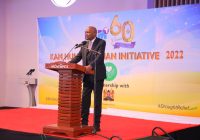“The Legacy of Wangari Maathai Lives On” says daughter Wanjira Mathai on Wangari Maathai Day and Africa Environment Day.
3rd March, the African Union-established Africa Environment Day, also marks Wangari Maathai Day that celebrates the work of Kenyan environmentalist Professor Wangari Maathai. In 2004, Prof. Maathai became the first African woman to be awarded a Nobel Peace Prize “for her contribution to sustainable development, democracy and peace”. 2021 marks 10 years since Prof. Maathai’s passing. Her daughter, Ms Wanjira Mathai spoke to Raphael Obonyo for Africa Renewal about continuing her mother’s legacy: Here are excerpts:
Wanjira Mathai: Thank you for honouring this day, Wangari Maathai Day, Africa Environment Day and World Wildlife Day. It a triple celebration day!
Can you start by telling us a bit about yourself?
I am a mother of two girls, and I consider myself one of the holders of my mother – the late environmentalist Prof. Wangari Maathai’s legacy. I was honoured to have worked with her for 12 years and it was an eye-opening, inspiring, and learning moment for me. My background is in public health and business, and one time I was home for a break when my mother said, “Come and work with me, help me with this”. So, in the process of working with her, I got pulled into her life and passion at her organization – the Green Belt Movement. I spent those years getting to understand what drove her. She was a good example of someone who was literally working at the exclamation point of her passion.
How so?
My mother was passionate about the environment and the people, especially the most vulnerable, women and youth. She was always looking at how she could use nature to generate income. Sadly, she passed on in September 2011. We set up the Wangari Maathai Foundation to continue her legacy. I am the Chairperson of the Foundation, and our work is focused on youth leadership, inspiring them to unpack the message of Wangari Maathai.
What was her message to young people?
Persistence, patience and commitment. This is what remains at the heart of the Wangari Maathai Foundation’s work. We are also proud of the Wangari Maathai Institute that was established at the University of Nairobi [in Kenya] that is now training PhD and Masters students on how to take what they have learnt in the classroom directly to communities, bridging the knowledge and practice gap.
Today, 3rd March, the world is commemorating Wangari Maathai Day and Africa Environment Day. What does this mean to you?
It means a lot. The African Union designated 3rd March, which was already the Africa Environment Day, as Wangari Maathai Day, in recognition of the contribution she made, the mark that she left on Africa’s environment and in many ways Africa’s wildlife. The habitats my mother fought so hard to protect are very important for biodiversity, and so this day is a special recognition. It is an honour of great proportion from the African Union.
Your mother, the late Prof. Maathai, would have turned 81 this April (2021). Can you share any words of wisdom that she passed on to you that still ring true today?
You know, there are so many words of wisdom I got from her. Every time I am asked this question, a different one comes to mind. She always talked about patience, commitment and persistence. The hummingbird story was in many ways the signature of her core message. The story starts with a huge fire consuming a forest. All the animals watch in disbelief, feeling overwhelmed and powerless, except this little hummingbird that kept shuttling back-and-forth to the river to fetch water, using its tiny beak, to put out the fire.
The lesson is that you shouldn’t feel overwhelmed by the enormity of a situation – just do the best you can to help. If everybody contributes in their own small way, like the hummingbird, change will happen.
I learnt that I shouldn’t be overwhelmed by the enormity of challenges we are facing – climate change or poverty – but that I should ask myself what I am doing to address it. That it is enough contribution – if am doing my best, with what I have, from where I am. That was a really important piece of advice.
Prof. Maathai was a fighter for justice, and she suffered a great deal as a result. How do you think that has shaped your own outlook on life?
Well, it was difficult. Things are different now – you and I have it completely different than she did. The struggles then were a lot more challenging. I always feel like we don’t have much of an excuse. A lot has been given to me, so a lot is expected.
My mother’s struggles were difficult, but she survived them. I feel that was a blessing in many ways. She exhibited a lot of courage, and in many ways, we stand on her shoulders. So, I feel inspired by her struggle, by her journey. If she came back today and found us still where she left us, that would be very disappointing. Our challenge now is to meet the challenges of our time with the same courage, or even more.
Tell us more about the Green Belt Movement, the organization your mother started in the 1970s that mobilized local communities to plant millions of trees?
I am always, in many ways, deeply inspired by the fact that 44 years ago, in 1977, my mother and others came up with this genius idea of starting the Green Belt Movement to mobilize local communities to restore their landscapes. They were ahead of their time. Today, it is one of the most important initiatives and strategies for addressing the biggest challenge of our time – climate change.
As an organization, the Green Belt Movement has its struggles as many organizations do, but I hope that its better days are ahead because its work is crucial in addressing, not just climate change, but also generating jobs for young people, restoring landscapes, reforesting, creating more opportunities in ecotourism, as well as for water, food, medicines and other products that we get from forests.
At the height of the COVID-19 pandemic lockdowns here in Nairobi, we had the Karura Forest, Uhuru Park, City Park, and other places where people could go. We know how important nature is for our mental health. Karura Forest was one of the most visited places during the pandemic, it was a wonderful outlet, but also visionary because 30 years ago my mother fought hard to preserve it.
The Wangari Maathai Foundation seeks to advance her legacy. What are some of the projects the Foundation is carrying out?
Africa is the continent with the youngest population on the planet. At the Foundation, we want the young generation to step into the future with a set of values and character. We are about character building and inspiring the youth. We start with children in schools, developing programmes to build emotional intelligence and have a deep sense of integrity.
It is just about a year since your appointment as Vice-President and Regional Director for Africa at the World Resources Institute (WRI). What are some of your key achievements so far? What are your plans?
WRI is a research organization, so a lot of what we do is evidence-building and using that to influence how cities are evolving, how countries are prioritizing nature, and how they are protecting the most vulnerable.
Our strategy focuses on inclusive transformation for Africa’s people and landscapes. We offer a lot of data that demonstrates that it makes sense to invest in a green future. For the past year, we have been in lockdown, but we were able to refresh our strategy, to focus on fewer things, fewer places but go deeper, and do things that are really transformative. We must touch on poverty and begin to influence livelihoods, especially for rural communities and the most vulnerable. If you look at the data, about 80 per cent of the food eaten in many countries is produced by small-scale farmers and the majority of them – about 70 per cent – are women.


